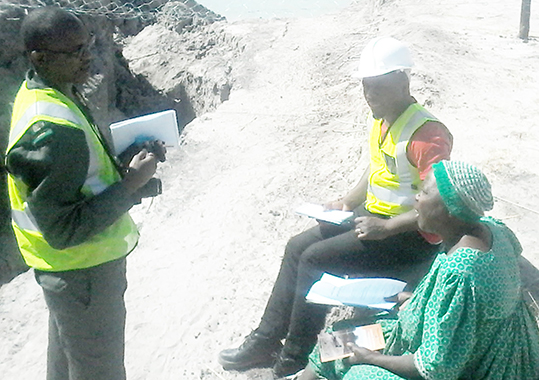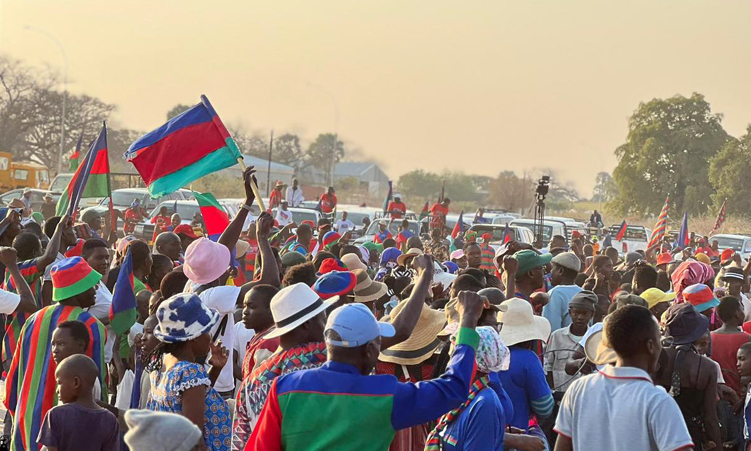AN INVESTIGATION by the environmental commissioner into alleged illegal sand mining activities in the Oshana region has unearthed a money-making scheme which has left deep scars in the natural landscape.
The investigation was conducted after land activist Job Shipululo Amupanda complained to environmental commissioner Theofilus Nghitila on 4 August.
Amupanda had said that the “dangerous open pits” dug in rural villages in the Oshana region, by what he branded “greedy foreign contractors”, have damaged the environment “in the name of profit”.
Nghitila reacted swiftly, dispatching a team of two experts – Simon Hangula and Ipeinge Mundjulu – to get the facts, enforce compliance and raise awareness.
Their four-day mission confirmed what Amupanda had alleged.
However, the officials said although their fact-finding mission took place immediately after Nghitila received that letter, that is only half the story.
“The mission was planned before that letter arrived,” said Mundjulu.
The Namibian accompanied the team as they visited old sites at the Omaalala-B village in the Ongwediva constituency, the Epukunoyana village in Ondangwa rural, as well as sites where contractors are currently mining sand in the Amutanga and Iikelo villages in the Okatana constituency.
The team found that some pits are too close to homesteads, and are life-threatening in that sand miners left without rehabilitating them as required by law.
Some pits are not fenced off, and in one instance, a deep open pit was found to be a mere five metres from a homestead.
The recent good rains transformed the open pits into water reservoirs which pose a danger to children who swim in them.
“These people are required by law to have an environmental clearance certificate, but that was not the case at all the sites we visited so far,” Mundjulu stressed.
“Sand extraction activities are being conducted in a way that not only puts the lives of residents and their livestock at risk, but also causes irreparable damage to the environment,” said Hangula.
The culprits include the Chinese companies contracted to build the railway line between Ondangwa and Oshakati, and the gravel road from Okatana to Ompumbu, respectively.
Hangula said they would submit their report to Nghitila, with recommendations to penalise the violators and to order them to rehabilitate the sites.
The environmentalists also distributed copies of relevant legal documents to raise awareness, and left their contact details with both the contractors and the affected villagers.
Meanwhile, sand mining has become a cash cow for impoverished villagers who have started offering their mahangu fields to the Chinese contractors to mine sand.
A villager can get between N$50 000 and N$100 000 for allowing Chinese contractors to mine sand in their mahangu field.
Although environmental officials say the villagers are being ripped off, villagers see it as a windfall, and are now lining up to offer their land to the contractors.
In the Epukunoyana village, the environmental officials were approached by a villager who, paying no attention to the vehicle’s GRN number plate and without being prompted, offered his mahangu field to them.
“You can start mining immediately,” he said even before the officials could introduce themselves.
“He perhaps thought we were representatives of Chinese contractors,” said Mundjulu as the team proceeded with its investigation.
However, the money paid by Chinese contractors is also driving a wedge between villagers and the traditional authorities, as well as between couples as they disagree on how to use the money.
One lady freely narrated her ordeal. She said her husband took the N$50 000 and just left.
He now stays elsewhere, and only visits occasionally.
“I have no clue how the money was spent. He only bought building materials for that shack over there,” she said, pointing at a recently erected shack.
Customarily, the money from sand mining activities is shared between the owner of the mahangu field, the headman and the traditional authority office.
Stay informed with The Namibian – your source for credible journalism. Get in-depth reporting and opinions for
only N$85 a month. Invest in journalism, invest in democracy –
Subscribe Now!






